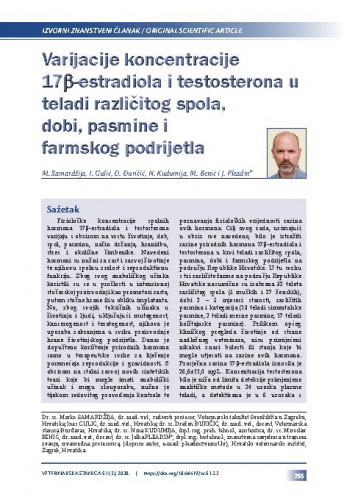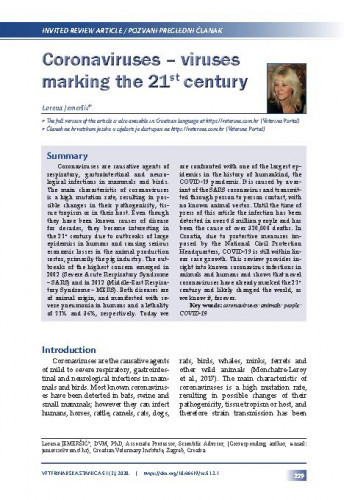Fiziološke koncentracije spolnih hormona 17β-estradiola i testosterona varijaju s obzirom na vrstu životinje, dob, spol, pasminu, način držanja, hranidbu, stres i okolišne čimbenike. Navedeni hormoni su nužni za rast i razvoj životinje te njihovu spolnu zrelost i reproduktivnu funkciju. Zbog svog anaboličkog učinka koristili su se u prošlosti u intenzivnoj stočarskoj proizvodnji kao promotori rasta, putem stočne hrane ili u obliku implatanta. No, zbog svojih toksičnih učinaka u životinja i ljudi, uključujući mutagenost, kancerogenost i teratogenost, njihova je uporaba zabranjena u svrhu proizvodnje hrane životinjskog podrijetla. Danas je dopušteno korištenje prirodnih hormona samo u terapeutske svrhe za liječenje poremećaja reprodukcije i gravidnosti. S obzirom na stalni razvoj novih sintetskih tvari koje bi mogle imati anabolički učinak i mogu zlouporabu, nužno je tijekom redovitog provođenja kontrole te poznavanja fizioloških vrijednosti razina ovih hormona. Cilj ovog rada, uzimajući u obzir sve navedeno, bilo je istražiti razine prirodnih hormona 17β-estradiola i testosterona u krvi teladi različitog spola, pasmina, dobi i farmskog podrijetla na području Republike Hrvatske. U tu svrhu s tri različite farme na području Republike Hrvatske nasumično su izabrana 32 teleta različitog spola (5 muških i 27 ženskih), dobi 2 ‒ 5 mjeseci starosti, različitih pasmina i kategorija (13 teladi simentalske pasmine, 2 teladi mesne pasmine, 17 teladi holštajnske pasmine). Prilikom općeg kliničkog pregleda životinje od strane nadležnog veterinara, nisu primijećeni nikakvi znaci bolesti ili stanja koje bi mogle utjecati na razine ovih hormona. Prosječna razina 17β-estradiola iznosila je 28,8±11,0 ng/L.; Physiological levels of the sex hormones 17β-oestradiol and testosterone vary based on animal species, age, sex, breed, rearing technology, nutrition, stress and environmental factors. These hormones are essential for growth and development, and for sexual maturity and reproductive function. Due to their anabolic effects, they have been used as growth promoters in intensive livestock production, applied in feed or as an implant. However, due to their toxic, mutagenic, teratogenic and cancerogenic effects in animals and humans, their use is now banned in food animal production. Today, the use of these natural hormones is permitted exclusively for therapeutic purposes in the treatment of reproductive and pregnancy disorders. Considering the constant development of new synthetic substances that might have anabolic effects and their possible misuse, it is necessary to perform regular controls during the fattening period to determine the physiological values of the levels of these hormones. Accordingly, the aim of this study was to investigate the physiological levels of the natural hormones 17β-oestradiol and testosterone in the blood of calves of different sex, age, breed and farm origin in the Republic of Croatia. For this purpose, 32 calves of both sexes (5 males and 27 females), aged 2-5 months, of different breeds and categories (13 calves of Simmental breed, 2 calves of meat breed and 17 calves of Holstein breed) were randomly selected from three farms for inclusion in this study. During general clinical examination by an authorized veterinarian, no visible clinical changes or conditions were observed that could influence the physiological levels of the investigated hormones. The average level of 17β-oestradiol was 28.83±10.95 ng/L.
Sažetak

 Veterinarska stanica : 51,3(2020) / glavni i odgovorni urednik Marko Samardžija.
Veterinarska stanica : 51,3(2020) / glavni i odgovorni urednik Marko Samardžija.